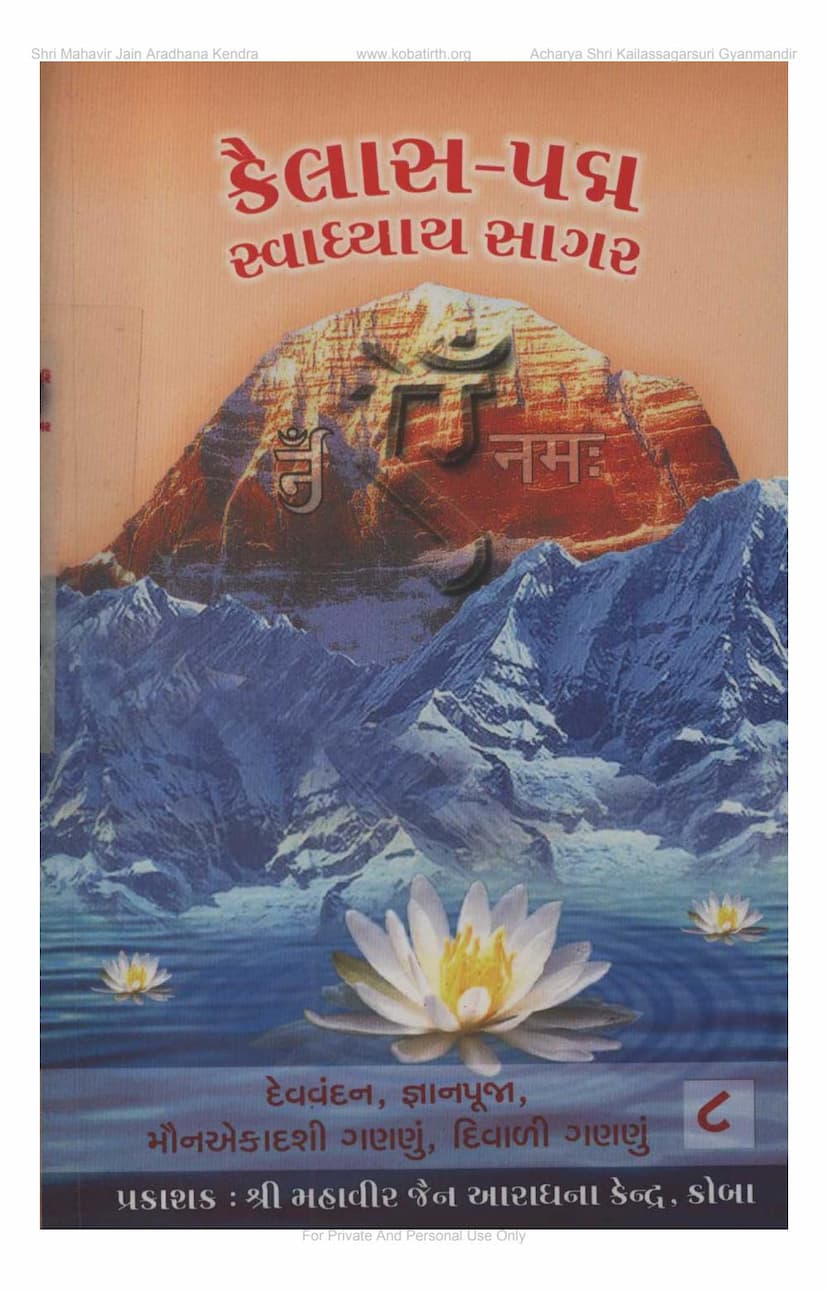Kailaspadma Swadhyayasagara Part 8
Added to library: September 2, 2025

Summary
This document is Volume 8 of the "Kailaspadma Swadhyayasagara" series, compiled by Padmaratnasagar and published by Shri Mahavir Jain Aradhana Kendra, Koba. The title of this specific volume is "Kailaspadma Swadhyayasagara Part 8: Devavandan, Jnanapuja, Maun Ekadashi Gananu, Diwali Gananu" (Page 5).
The book is presented as a collection of Jain devotional texts and practices, specifically focusing on various forms of "Devavandan" (worship of deities or enlightened beings), "Jnanapuja" (worship of knowledge), and specific religious observances like "Maun Ekadashi" (Silent Eleventh Lunar Day) and "Diwali Gananu" (Diwali counting/practices).
Key aspects highlighted in the provided pages include:
- Dedication and Purpose: The book is dedicated to the Jain community, aiming to provide useful resources for monks, nuns, and spiritual seekers. It is published to commemorate significant events related to respected Acharyas, including the 52nd anniversary of the ascetic life of Rashtrasant Acharya Shri Padmasagarsurishwarji and the 72nd birthday of the esteemed Acharyas (Page 4, 6). The publication aims to spread the glory and impact of the Jain Shasan (teachings).
- Authorship and Compilation: The compilation and editing of "Swadhyaya Sagar" (which this volume is a part of) were undertaken with great effort by Muni Shri Railokyasagarji. The current volume, "Kailaspadma Swadhyayasagara," is a revised and expanded edition of the "Swadhyayasagara" (Page 8, 9).
- Content Overview:
- Devavandan: The majority of the text consists of various "Devavandan" compositions dedicated to the 24 Tirthankaras, including hymns and praises. Each Tirthankara's birth, lifespan, characteristics, and significance are detailed in a devotional manner.
- Specific Devavandans: The book includes specific "Devavandans" associated with:
- Jnanapad Puja: A detailed puja and hymns dedicated to knowledge (Page 11 onwards).
- Choumasi Devavandan: Likely related to the four-monthly observances (Page 16 onwards).
- Jnanpanchami Devavandan: Devavandan for the fifth day of knowledge, likely a festival celebrating knowledge (Page 54 onwards).
- Maun Ekadashi Devavandan: Worship for the silent eleventh lunar day (Page 77 onwards).
- Diwali Devavandan: Worship for Diwali, the festival of lights, which in Jainism is associated with the Nirvana of Lord Mahavir (Page 100 onwards).
- Gananu (Counting/Practices): Specific instructions or enumerations related to "Maun Ekadashi" and "Diwali" are mentioned (Page 5, 111).
- Tirth Stavan (Praise of Holy Places): Several stanzas are dedicated to praising important Jain pilgrimage sites like Shatrunjaygiri, Girnar, Abu, Ashtapad, and Sametshikhar (Page 45 onwards).
- Saraswati Yantra-Mantra: A section includes a mantra and yantra dedicated to Goddess Saraswati, the deity of knowledge (Page 134).
- The series as a whole: Page 135 shows a list of other volumes in the "Kailaspadma Swadhyayasagara" series, indicating a comprehensive approach to Jain scriptures and practices.
- Spiritual Emphasis: The text repeatedly emphasizes the importance of "Swadhyaya" (self-study) for spiritual growth and the attainment of liberation. It highlights the concept of "Atmaramanata" (self-absorption) as an inner value (Page 5, 6).
- Acknowledgement of Contributors: The publication acknowledges the efforts of various Acharyas, Munis, scholars, and individuals who contributed to the compilation, editing, research, and publication of the book. It also thanks donors who supported the project (Page 8, 9, 10).
- Language and Style: The text is primarily in Gujarati, with some devotional verses and hymns also presented in a more poetic and traditional style.
In essence, "Kailaspadma Swadhyayasagara Part 8" is a devotional manual providing a rich collection of prayers, hymns, and guidelines for various Jain rituals and observances, with a particular focus on the worship of Tirthankaras, the significance of knowledge, and important festivals and days of spiritual observance.